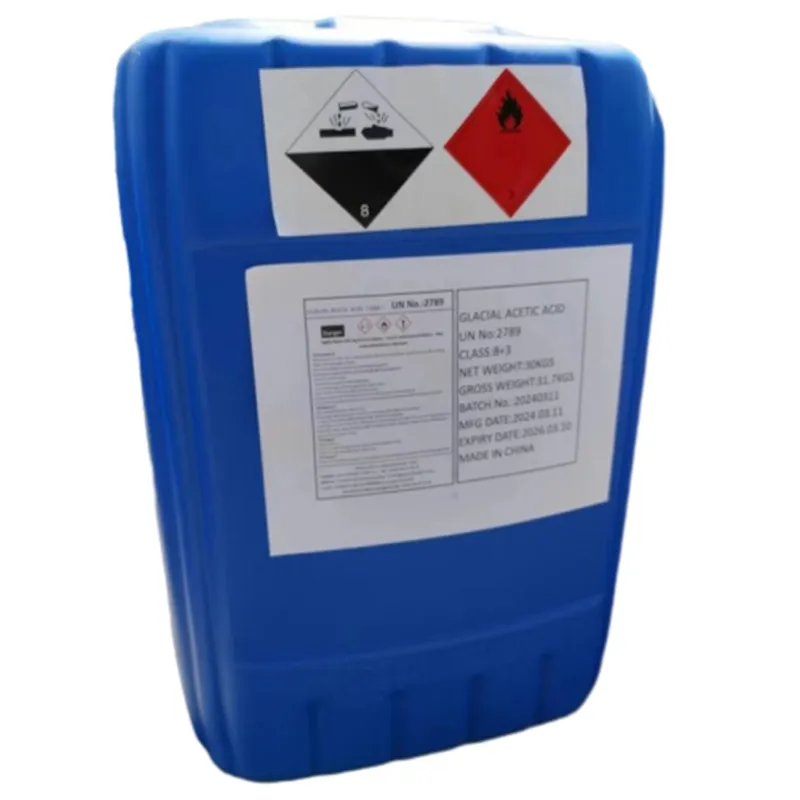
Understanding the Properties and Applications of 85 Percent Formic Acid
Understanding Formic Acid Properties, Uses, and Safety
Formic acid, also known by its systematic name methanoic acid, is the simplest carboxylic acid with significant industrial and biological importance. Present in various biological systems, formic acid is best known for its role in the defense mechanisms of ants and some other insects, which is where it gets its name. The chemical formula for formic acid is HCOOH, and it appears as a colorless, pungent liquid.
One of the most common concentrations of formic acid available in the market is 85% formic acid, which is a highly concentrated solution. Understanding the properties and applications of this substance is essential for those working in fields such as chemistry, biochemistry, agriculture, and manufacturing.
Properties of Formic Acid
Formic acid has several noteworthy properties. It has a boiling point of 100.8 °C (213.4 °F) and a density of 1.22 g/cm³. This indicates that it is a relatively volatile liquid. The compound is hygroscopic, meaning it can absorb moisture from the environment, which can intensify its corrosive nature. Formic acid can dissolve in water, alcohols, and ethers, making it versatile for various applications.
The acidity of formic acid is relatively strong for a simple carboxylic acid, with a pKa of approximately 3.75. Because of its acidity, it can participate in various chemical reactions, including esterification, amidation, and decarboxylation. Its reactivity allows it to be an important intermediary in organic synthesis.
Applications of Formic Acid
The applications of 85% formic acid are diverse and critical across multiple industries.
1. Textile Industry Formic acid is used in the dyeing and finishing processes of textiles. It helps in the fixation of dyes, allowing for vibrant colors that adhere well to the fabric. This property makes it indispensable in the manufacture of synthetic fibers.
acid formic 85

2. Leather Production In the leather industry, formic acid is crucial for pickling hides and skins before tanning. Its acidity helps in swelling the collagen fibers, preparing them for the subsequent tanning processes.
3. Agriculture Formic acid also has agricultural applications. It is used as a preservative and acidifier in animal feed, promoting better nutrient absorption and preventing bacterial growth. Additionally, it serves as a pesticide, particularly against varroa mites in beekeeping, helping protect bee populations and ensuring higher honey yields.
4. Chemical Synthesis In organic chemistry, formic acid is employed as a reducing agent and as a source of the formyl group in various reactions. Its role in synthesizing chemicals, pharmaceuticals, and agrochemicals contributes to its importance in the chemical manufacturing industry.
5. Food Industry Although less common, formic acid can also be found in the food industry, where it serves as a food additive and preservative, particularly in some dairy products and processed foods.
Safety Considerations
Despite its numerous applications, formic acid is a hazardous substance that requires careful handling. 85% formic acid is corrosive and can cause severe burns upon contact with skin or eyes. Inhalation of its fumes can irritate the respiratory tract, leading to coughing and breathing difficulties. Thus, proper personal protective equipment should be employed when working with this compound.
In laboratories and industrial settings, it is essential to use appropriate containment measures to prevent spills, and any incidents should be handled immediately. Adequate training on the safe handling of chemicals is also vital for reducing risk.
Conclusion
Formic acid, particularly in its 85% concentration, is a compound of immense importance across various sectors. From textile dyeing to agricultural applications and chemical synthesis, formic acid's versatility cannot be overstated. However, it is crucial to be aware of its hazards, ensuring safety protocols are always followed. Understanding both the potential benefits and dangers associated with this compound can lead to more effective and safe utilization in industries worldwide.
-
Aluminum Hydroxide: Quality Gels & Dried Gel AntacidNewsAug.31,2025
-
Buy High-Quality Trichloroisocyanuric Acid for Sale | TCCA 90% SupplierNewsAug.30,2025
-
Pure Sodium Dichloroisocyanurate Dihydrate | Powerful DisinfectantNewsAug.29,2025
-
Industrial Chemicals: Quality & Purity for Every IndustryNewsAug.28,2025
-
Nitrile Rubber Honoring Strict Production StandardsNewsAug.22,2025
-
Aspartame Ingredients Honoring Food Safety ValuesNewsAug.22,2025
-
Fertilizer for Balanced Plant NutritionNewsAug.22,2025
Hebei Tenger Chemical Technology Co., Ltd. focuses on the chemical industry and is committed to the export service of chemical raw materials.
-

view more DiethanolisopropanolamineIn the ever-growing field of chemical solutions, diethanolisopropanolamine (DEIPA) stands out as a versatile and important compound. Due to its unique chemical structure and properties, DEIPA is of interest to various industries including construction, personal care, and agriculture. -

view more TriisopropanolamineTriisopropanolamine (TIPA) alkanol amine substance, is a kind of alcohol amine compound with amino and alcohol hydroxyl, and because of its molecules contains both amino and hydroxyl. -

view more Tetramethyl Thiuram DisulfideTetramethyl thiuram disulfide, also known as TMTD, is a white to light-yellow powder with a distinct sulfur-like odor. It is soluble in organic solvents such as benzene, acetone, and ethyl acetate, making it highly versatile for use in different formulations. TMTD is known for its excellent vulcanization acceleration properties, which makes it a key ingredient in the production of rubber products. Additionally, it acts as an effective fungicide and bactericide, making it valuable in agricultural applications. Its high purity and stability ensure consistent performance, making it a preferred choice for manufacturers across various industries.





